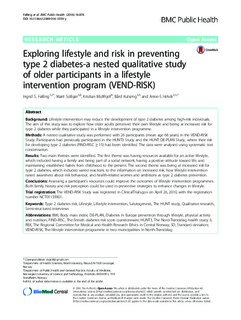Exploring lifestyle and risk in preventing type 2 diabetes-a nested qualitative study of older participants in a lifestyle intervention program (VEND-RISK)
Følling, Ingrid Sørdal; Helvik, Anne-Sofie; Kulseng, Bård Eirik; Solbjør, Marit; Midthjell, Kristian
Journal article, Peer reviewed
Permanent lenke
http://hdl.handle.net/11250/2403220Utgivelsesdato
2016Metadata
Vis full innførselSamlinger
Sammendrag
Background:
Lifestyle intervention may reduce the development of type 2 diabetes among high-risk individuals. The aim of this study was to explore how older adults perceived their own lifestyle and being at increased risk for type 2 diabetes while they participated in a lifestyle intervention programme.
Methods:
A nested qualitative study was performed with 26 participants (mean age 68 years) in the VEND-RISK Study. Participants had previously participated in the HUNT3 Study and the HUNT DE-PLAN Study, where their risk for developing type 2 diabetes (FIND-RISC ≥ 15) had been identified. The data were analysed using systematic text condensation.
Results:
Two main themes were identified. The first theme was having resources available for an active lifestyle, which included having a family and being part of a social network, having a positive attitude toward life, and maintaining established habits from childhood to the present. The second theme was being at increased risk for type 2 diabetes, which included varied reactions to the information on increased risk, how lifestyle intervention raised awareness about risk behaviour, and health-related worries and ambitions as type 2 diabetes prevention.
Conclusions:
Assessing a participant’s resources could improve the outcomes of lifestyle intervention programmes. Both family history and risk perception could be used in preventive strategies to enhance changes in lifestyle.

